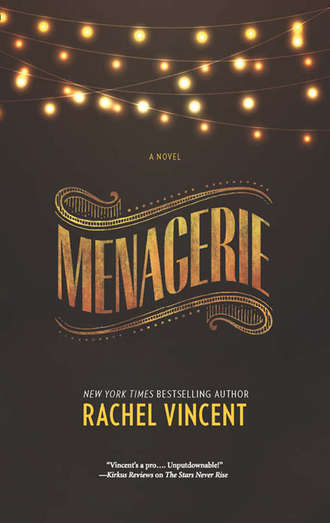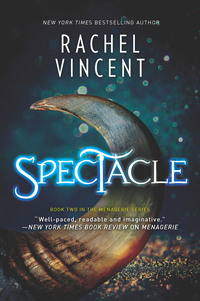
Полная версия
Menagerie
Reactionary legislation had spawned outfits like Metzger’s, where anything and everything not deemed to be human could be locked up and put on display with no limits, no boundaries, and no regulations except those meant to protect employees and spectators. Which made people like me—the admittedly quiet minority—profoundly uncomfortable.
My tension headache told me I shouldn’t have accepted the tickets. My queasy stomach said I shouldn’t be celebrating my birthday at the menagerie where, as a child, I’d been shocked to see three malnourished little girls locked in an animal pen wearing no more than a few filthy scraps of material. Because when I remembered the reaping—inarguably the most profound tragedy to ever strike the U.S.—I also remembered the millions of innocent cryptids who’d been rounded up and thrown in prisons or shot on sight for resisting arrest.
By the time I was born, several years after the reaping was discovered, the government had begun denying citizenship and legal rights to any living being only partially human, as well as to any hybrid of two or more different biological families.
What that meant was that ligers and mules were protected by the ASPCA because they were both hybrids of two animals that share the same biological genus and family. But because the griffin is a hybrid of two different classes—Mammalia and Aves—and three different orders—Carnivora, Artiodactyla, and Squamata—it isn’t recognized as a natural animal but as a cryptid “beast.” Anything considered “unnatural” under such legislation was denied protection under U.S. law.
That secondary national tragedy, a clean sweep of everyone not wholly human or “naturally” fauna, had been brushed under the rug, and even mentioning it made my friends and coworkers look at me as if I’d just set fire to the U.S. flag. So I’d stopped talking about it. But I hadn’t stopped feeling it.
Yet deep down, I was dying to see the strange and amazing creatures I’d studied in school, for all the same reasons that had led me to major in crypto-biology in the first place. I wanted to see the beautiful selkie emerging from her seal-skin. The troll, so tall and thick he couldn’t stand up in most human-scale buildings. The man who could turn into a cheetah at will. The part of me that objected to the confinement and abuse of such beings was the very same part that needed to see them for myself.
To understand.
Metzger’s had no right to exploit the creatures in its custody, but that wouldn’t end whether I looked at them or not. And who better than I to truly appreciate, rather than taunt or mock?
At least, that’s how I rationalized my warring desires to both condemn and experience the spectacle.
At the center of the menagerie, towering over everything else, was the big top, an enormous red-and-white-striped circus tent with three sharp peaks that cast an ominous shadow over the fairgrounds. The entrance flaps remained tightly closed until a paying guest was admitted, making it impossible to catch even a passing glimpse of the mysteries within. Around the perimeter of the menagerie stood a series of smaller tents and attractions, and branching from those were a series of themed subsections. Everything from the posters and cages to the costumes and music was designed with a vintage feel so that it seemed as though we’d stepped back in time.
Up first was the bestiary, where cryptid animals lounged or paced in sideshow cage wagons modeled after circus train cars from the early 1900s. They had bright, intricately carved frames and huge wooden wheels, and the beasts within were visible from both sides, through thick iron bars reinforced with sheets of modern steel mesh.
The mesh was a recent requirement, after a twelve-year-old had lost her right hand to an irritable troll in a carnival out West somewhere, a few years back.
Shelley oohed and aahed over the chimera, a beast with the body and claws of a lion, two heads—one lion, one goat—and a snake for a tail. “Delilah, look how thick and smooth his fur is!” she cried, her nose inches from the side of the cage. I gently tugged her back by one arm. Anything with claws and venom should be appreciated from at least two feet away. “So glossy!”
But when the creature turned to pace four steps in the other direction—the full length of its cramped quarters—I noticed that the fur on the goat head’s side was matted and dirty. Obviously that half didn’t self-groom.
“Here, kitty, kitty!” Shelley called, and the snake growing in place of the beast’s tail hissed at her.
“He’s not a kitty, Shell,” Brandon said. “He’s a ferocious beast capable of tearing you apart with three different jaws at once.”
“He’s not a he.” I pointed at a sign attached with twists of wire to the bars on one end of the cage car. “Her name is Cleo. She’s eighty-six years old, as of last spring,” I said, still reading from the plaque. “Born in the wild well before both the reaping and the repeal of the Sanctuary Act, and still in her prime today.” I stepped back for a better look. “Poor thing. By the time she dies, she’ll have spent three-quarters of her life in a cage.”
Rick rolled his eyes. “They’re animals, Delilah. They don’t even know where they are.”
“We’re all animals. From the taxonomy kingdom Animalia. And you don’t know what she knows or feels. Have some respect. She’s your elder.”
Rick laughed as if I’d made a joke. He tried to put one arm around me and when I pulled away from him, I tripped over a rock and had to grab one of the cage’s bars to keep from falling. The heavy cage rocked just a little, and the chimera twisted toward me faster than I would have thought something with three heads could move. The snake hissed and the lion head roared.
I froze, intuitively trying not to trigger any further predatory instinct, but Shelley screeched and jumped back.
Rick laughed at her. Brandon pulled me away from the cage and didn’t let go even after I’d regained my balance, my heart still racing.
“Don’t touch the exhibits,” a deep voice growled, and we turned to find a large man in a bright red baseball cap standing near the end of the chimera cage. His red polo shirt bore the Metzger’s logo and the name embroidered over his heart read Gallagher. His hair was thick and curly beneath his cap and his eyes were dark gray. “Unless you want to lose a lot of blood.”
“I tripped.” In the glare from the setting sun, I noticed several old scars on his face and his forearms, and I wondered how many of those had come from beasts he was in charge of. And how many of them he deserved.
“Cleo’s in an iron cage, surrounded by steel mesh,” Rick said. “What’s she going to do, roar until our ears bleed?”
The man tugged the bill of his red cap down, shading more of his strong features. “Only a fool believes his eyes over all other senses.”
Shelley laughed out loud while Rick fumed, and when I turned back for another glimpse of the large man in the red hat, he was gone.
Shelley and I dragged the guys toward the next cage: Panthera leo aeetus. Commonly known as a griffin.
Rick and Brandon were fascinated by the griffins, both perched on dead tree branches bolted to the ends of their massive aviary on wheels. They had the hindquarters of a lion and the majestic head, wings, and front claws of an eagle.
An eagle on the physical scale of a lion.
I’d seen them on television and studied them in school, but I’d had no appreciation for their size until I stood in front of them. They must have weighed at least five hundred pounds each.
Brandon shouted at one, unrebuked by another large, gruff handler, and was rewarded when the griffin suddenly threw his enormous wings out and flapped, as if he’d dive at us. We all gasped and backpedaled. The griffin pulled his dive up short at the last second, and I noticed that a patch on his right wing, along the top ridge, was bare of feathers at exactly the spot his wing would have hit the bars, if he hadn’t stopped.
The griffin made a horrible avian screech and I covered both my ears, but when he settled on a branch closer to us, still riled up from being teased, I realized that his sharp eagle’s beak and incredible wingspan were far less intimidating than his feet, a lethal cross between a lion’s claws and a bird’s talons.
They were huge. And sharp. I noticed a dried chunk of raw meat wedged between his first and second digits.
My heart ached for him. The griffin was obviously meant to soar the skies and stalk the plains in wide-open freedom. None of which he would get in the menagerie. Yes, griffins could be dangerous, but so could bears and sharks and alligators, yet we didn’t round them all up and throw them into cages.
After the griffins came the phoenix. Shelley was disappointed when it refused to burst into flames, then rise from its own ashes for her personal amusement, even though the signs wired to its cage said the poor thing wasn’t due for a “rebirth” for nearly another month. I thought it was beautiful, even without the flames. The phoenix had a long graceful swan-like neck with plumage in vibrant graduating shades of red, yellow, and orange. Its broad sweeping tail would have made any peacock jealous.
After the bestiary, we skipped the “Natural Oddities” section, which promised us trolls, ogres, goblins, and other assorted humanoid creatures of legend. Brandon led the way toward the “Human Hybrids” section, where the sign at the entrance promised us “bizarre and fascinating combinations of man and beast.”
“Come forward, come forward!” the uniformed man at the tent entrance called, waving us closer with both white-gloved hands. “Metzger’s guarantees you’ve never seen a spectacle like this, no matter what other shows you’ve attended. No one else on earth has such an extensive collection of grotesque mergers of human and animal flesh as you’ll find in this very tent. Wolf and man, horse and man, fish and man, bird and woman...” He winked at Rick. “We’ve got it all! And don’t forget to take a peek at our world-famous minotaur! You won’t find another like him anywhere else in the continental U.S.!”
“It sounds really freaky,” Shelley said.
“That it is, that it is.” The talker bowed deeply, top hat in hand. “But you’ve got these lucky gentlemen to keep you and your friend safe.” He gave the guys another faux-confidential wink, and I almost laughed out loud. Brandon got nervous when he heard coyotes howl at night.
The man in the top hat glanced at our bracelets, then held back a canvas flap with a practiced flourish.
“Seriously, what’s it like in there?” Shelley asked before Rick could push his way inside.
The carny shrugged with an evasive smile. “Some people love it. Gives others the willies. But what I can tell you is that you can’t truly know who you are in here—” he laid one gloved hand over his red sequined vest “—until you’ve been through there.” He pushed the tent flap open wider.
Brandon, Shelley, and Rick stared into the darkness.
I stepped inside.
“Shock and grief echo across the United States this morning with the news that more than one million children died overnight, most reportedly killed in their sleep. Government officials and residents alike watch, stunned, as the reports continue to pour in, raising the death toll by several thousand per hour...”
—As reported by anchor Brian Richards on
U.S. Morning News, August 24, 1986
Delilah
My ears roared with my own pulse as my friends followed me through the low entrance into the soaring tent, where a circle of faux-vintage wagon cages surrounded a bright red circus ring. The ring was empty except for a tall stool in the center, dramatically illuminated by a stark spotlight. Unoccupied bleachers lined the shadowy perimeter of the space, set up for a show to come later that night.
The farm scent was much less noticeable in the hybrid tent, where all the exhibits were at least part human, but there was yet more hay beneath our feet and the prevailing ambient noise was still the whisper of paws against hard surfaces and the occasional clomp of hooves.
Like the wagons in the bestiary, those in the hybrid tent had solid steel—or iron?—end panels, complete with massive, heavy-looking couplings with which they could be connected to the other cars. In theory. However, the rust on the hitches made me doubt that they were ever hooked to anything for very long.
Though we couldn’t see inside the cars with their end panels facing us, we could see into the wagons across the ring, where vaguely humanoid beings paced, slouched, or sat in the corners of their cages, wearily trying to ignore their audience.
A woman in a red sequined leotard and red-trimmed black top hat stepped forward when we got to the entrance of the ring, defined by padded crimson ropes strung between two shiny metal posts. “Welcome to the human hybrids tent, where every genetic atrocity you can imagine is on display to satisfy your curiosity!” Her name tag read Wendy, and she was cradling something in the crook of her left arm.
“Oh!” Shelley rushed toward the woman and the small bundle she held. “He doesn’t look so atrocious!”
Wendy gave her a slick, indulgent smile. “No, this little guy is damn near adorable.” She leaned into the light and I saw that she held an infant satyr, whose furry brown goat legs ended in tiny hooves. His chubby little belly and everything north of it was human, except the tiny horns growing from the sides of his skull.
I’d never seen anything cuter in my life.
“His mother just fed him, and I was about to take him back to the petting zoo.” Wendy twisted toward the circle of cages with hardly a glance at her young charge. “His mother’s the one at the back of—”
“Oh, can I hold him first?” Shelley asked, already reaching for the infant.
“I...um...” Wendy sputtered, obviously unsure how to answer. “I guess. Just for a second.” She laid the child in my best friend’s arms, while Rick and Brandon watched, dumbfounded.
“His fur tickles.” Shelley ran one finger down his fuzzy shin and over his hoof, but the child’s eyes never fluttered. He didn’t even seem to feel the touch.
“Why isn’t he moving?” I asked Wendy.
She shrugged. “He has a full belly. He’s passed out cold.”
That much was true, but it had nothing to do with the state of his stomach. I gently pulled back the baby’s left eyelid, then his right. “He’s not full, he’s sedated.” I frowned up at Wendy. “Why would you sedate an infant?” I demanded. Brandon put one hand on my shoulder to calm me, embarrassed by what he no doubt saw as an irrational tantrum on my part, but I shrugged him off. “He’s not a threat. He’s a baby.”
Wendy’s patronizing smile faltered. “If the reaping taught us anything, it’s that a threat can come in any size.” She took the baby back, and with it, her bright, cheery expression, which now looked as false as her ridiculously long, ridiculously red fingernails. “Now, if you’d like to see the kind of monster this little guy will grow into—” she swept her empty arm toward the wagon car on our left “—start here and follow the circle counterclockwise.”
My gaze followed the path formed between the outer loop of wagons and the inner, twelve-inch-high circus ring. Several other customers were clustered at various points on the path.
“When you get to the far side of the circle, go through the gate to the adjoining tent for a look at our special exhibits.”
Rick’s eyes brightened. “Is that where you keep the mermaids?”
She nodded and gave him an almost intimate smile, as if she were letting us in on a special secret. “Along with a couple of our other rare specimens. Including the Brazilian encantados—dolphin shape-shifters—and our world-famous minotaur.”
Brandon shoved Rick’s shoulder. “I told you there were mermaids!”
Wendy’s smile grew, and she was now ignoring me completely. “Just make sure you stay on the path and out of the center ring.”
“Why? What happens there?” Shelley asked.
“At the eight-o’clock show, one of the werewolves will do a live shift. I’ve seen it a million times, and it’s still incredible. You can’t miss it!” She laughed at Shelley’s worried expression. “They’re chained the whole time, even inside the safety cages, and they’re surrounded by armed handlers, too.” She gave each of us a full-color glossy pamphlet. “And the ten-o’clock show is stunning!” She gestured toward the ring with a familiar, wide-armed wave. “The draco sets two rings on fire and the cat shifters jump through them.” Her arm rose gracefully to take in the soaring ceiling of the tent. “They put a bird net around the whole thing, and the harpies make several breathtaking dives. I guarantee you’ve never seen anything like it. It’s the highlight of the evening.”
I stared at the pamphlet. I wanted to see the draco breathe fire and the harpies swoop and dive, but wanting something didn’t give one the right to have it. While I could rationalize my willingness to walk through passive exhibits I found fascinating yet morally repulsive, I could not justify sitting through a show in which sentient creatures were forced to perform against their will.
Though the prices Metzger’s was able to charge made it clear that I took the minority viewpoint on that.
“Do the shows cost extra?” Rick asked.
“Um...let me see your bracelet.” Wendy glanced at the wrist he held out. “Nope, you guys have the deluxe admission. You can go anywhere and see anything, except for the staff-only and staging areas.”
“Awesome,” Shelley said.
Wendy smiled and wished us a great evening, though her smile staled when it landed on me, then gestured for us to enter the ring. As we approached the first huge circus wagon, I glanced back to find her talking to Gallagher, the handler in the red cap, who’d snapped at me for touching the chimera cage.
They were both watching me.
I made myself turn back to my friends just as Shelley gasped. “He’s so big!”
For a second, I thought she was talking about the huge handler, and I almost nodded in agreement. Then I realized she was staring into the first cage, a silver-trimmed green masterpiece with fleurs-de-lis and stylized howling wolf heads carved into the corners. I hurried to catch up with my friends and as soon as I stepped in front of the first cage, labeled Claudio—Werewolf, I lost my breath.
Claudio was beautiful.
His eyes were golden, like multifaceted bits of amber, and while they were clearly wolf eyes, they contained an obvious understanding—a self-awareness that ordinary wolves’ eyes didn’t have. His fur was thick and silver and glossy, and when he paced into the half of his cage that was lit from the overhead lights, I saw that his silver coat was actually made up of many different shades of black, white, and gray. His fur shifted with each movement, the color rippling and buckling as each individual hair reflected the light at a slightly different angle.
I stared, transfixed.
Claudio growled at us softly, padding back and forth in a cage that was much too confined, because Shelley was right. He was huge.
“I didn’t realize how big they’d be,” Brandon said.
“Ordinary wolves don’t get that large,” I whispered, uncomfortably aware that the shifter could both hear and understand me, assuming he spoke English. “One hundred seventy-five pounds, max, for males. Most are closer to one-fifty.” By contrast, Claudio was two hundred pounds, by my guess—a wolf the size of a grown man—and in spite of an obviously confined lifestyle, he looked lean and powerful.
“The reality isn’t like the old monster movies,” I said, still speaking softly because somehow that felt more respectful of Claudio. “They don’t have superpowers. They’re strong and fast because they’re wolves, but they’re not superstrong, or superfast.”
“Yeah, but even a regular wolf can rip a man’s throat out,” Brandon said, and I couldn’t argue.
I stepped closer to the cage, fascinated, and Claudio snarled at me, lips curled back to reveal a muzzle full of lethally sharp teeth. The lump in my throat threatened to cut off my airway. “I’m so sorry,” I whispered, and the growling stopped. Claudio blinked and tilted his head in an oddly human display of surprise, and that stream of guilt trickling through me swelled into a veritable river, until my veins surged with it.
Claudio didn’t belong in a cage, and just by coming to observe him in captivity, I’d become part of the problem.
Anger on his behalf uncoiled like a living thing deep inside me and I gasped at the hot, unsettling sensation in my belly.
“Lilah!” Shelley called as she moved on to the next cart, a green-trimmed silver inverse of the werewolf’s, with full moons carved into the scrolling frame. “There’s a girl wolf!”
Claudio’s snarling resumed, more intensely than before, a reminder that he not only heard everything we said, but understood us, as well.
The plaque on the next circus wagon read Geneviève—Werewolf, but at first glance, the cage appeared empty.
“I don’t...” Something flashed in one dark corner of the cage, two pinpoints of yellow light, there, then gone. Then there again.
Geneviève was blinking.
Curiosity got the better of me and I squinted, trying to get a better look at her, but I could barely make out a small, hunched form in the shadows.
“I can’t see her,” Rick complained. “What good are two-hundred-dollar menagerie tickets if the exhibits are just going to hide?”
“I think she’s scared,” I said. Brandon took my hand, and Shelley nodded mutely.
“She’s scared? She’s the monster. We’re supposed to be scared of her.” Rick scowled, already walking backward toward the next car, which, according to the sign, held one of only four adlets currently living in captivity.
Adlets were the wolf version of a satyr, stuck in an in-between state with both canine and human features. They were also cannibalistic, highly aggressive, and one of the most effective arguments in favor of keeping cryptids locked up.
“Hold on a minute, now, you don’t want to miss this,” a voice called from the darkness behind the werewolf cages. Hay crunched beneath heavy footsteps, and a moment later something clanked against the bars on the rear of Geneviève’s cage.
The light reflecting from her yellow eyes blinked out.
Claudio’s snarling deepened and from our right, the adlet responded with a fierce, eerie howl of its own. On the other side of the ring, hooves and paws scraped the floors of other cages as the captives paced nervously.
Unease gathered in the pit of my stomach and crawled along my arms. My hair stood on end. The hybrids’ anxiety was both obvious and contagious.
“Just a sec.” A handler stepped into the light falling over and through half of Geneviève’s cage. He was a stout, balding man in a Metzger’s T-shirt but no vest, hat, or sequins whatsoever. His shirt was stained with sweat, his boots caked with dirt, and a lit cigarette dangled from his mouth. This was a behind-the-scenes man if I’d ever seen one. He held what looked like a thick stick. “This ought to get her up for you.”
Geneviève whined, and the sound reminded me of a puppy we’d had when I was in middle school, before she’d chewed up the legs of my dad’s favorite chair and he’d made us give her away.
Claudio growled, accompanied by a snarl from the adlet, and when assorted hisses, growls, and the clang of metal rang out from across the ring of circus wagons, I realized that the entire hybrid section of the menagerie knew exactly what was about to happen.
“Last warning, Genni,” the handler said, and though her whining intensified, her eyes did not open. Too late, I realized that the handler’s stick was actually an electrified cattle prod.
“No!” I shouted, and dimly I was aware that I’d squeezed Brandon’s hand hard enough to make him flinch. My other hand had crushed the glossy pamphlet.









